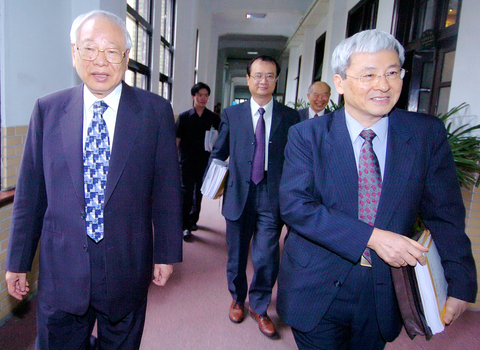Fingerprints will not be collected when people apply for their new national identification cards until the Council of Grand Justices issues an interpretation of the Household Registration Law (
Judicial Yuan Secretary-General Fan Kuang-chun (范光群) held a press conference yesterday on behalf of the council to announce the justices' decision to issue an interim order temporarily suspending the fingerprint policy until the council can rule on the matter.
According to Articles 8-2 and 8-3 of the law, applicants must provide their fingerprints when applying for the new photo ID cards, due to be issued starting July 1.

PHOTO: LIAO CHEN-HUI, TAIPEI TIMES
"We will follow the grand justices' interim order. That means the collection of fingerprints will be temporarily suspended," said Cabinet spokesman Cho Jung-tai (
Cho said those applying for the new cards will receive the old version until the grand justices issue an interpretation.
However, "If the grand justices decide that the fingerprinting policy must be carried out anyway, they will have to re-apply for the new cards and provide their fingerprints. If the justices decide against the policy, these people will still have to apply for the new cards but their fingerprints will not be taken," Cho said.
The Democratic Progressive Party legislative caucus complained that the fingerprint requirement violates both human rights and the Constitution. The caucus filed a request with the Council of Grand Justices for an interpretation on May 30.
According to Fan, 14 grand justices met yesterday morning. At around 1pm they decided to ask the Cabinet to suspend the policy.
According to Cho, there are two possible scenarios.
If the grand justices say the two articles violate the Constitution and should be amended, the law will be returned to the legislature for an amendment and new photo ID cards will not be issued before the amendment is passed.
If grand justices say the two articles are fine, then the fingerprinting policy will be resumed.
"Now that the interim order has been given, I think most people won't rush to apply for their photo ID cards, so I don't think the impact will be humongous," Cho said.
By law, every citizen older than 14 years of age must apply for a national ID card, providing their fingerprints and a new head-shot photo taken within the past six months. The photo has to be in a square format, with a white background and the face uncovered. Each of the new-format photos costs approximately NT$200.
Asked whether the government is ready to hear complaints from those who have already had their pictures taken, Interior Minister Su Jia-chyan (
"I believe that the grand justices will come up with a final ruling soon," Su said.
"In the meantime, I urge the public not to apply for the new cards before receiving an official notice from us," he said.

Taiwanese actress Barbie Hsu (徐熙媛) has died of pneumonia at the age of 48 while on a trip to Japan, where she contracted influenza during the Lunar New Year holiday, her sister confirmed today through an agent. "Our whole family came to Japan for a trip, and my dearest and most kindhearted sister Barbie Hsu died of influenza-induced pneumonia and unfortunately left us," Hsu's sister and talk show hostess Dee Hsu (徐熙娣) said. "I was grateful to be her sister in this life and that we got to care for and spend time with each other. I will always be grateful to

UNITED: The premier said Trump’s tariff comments provided a great opportunity for the private and public sectors to come together to maintain the nation’s chip advantage The government is considering ways to assist the nation’s semiconductor industry or hosting collaborative projects with the private sector after US President Donald Trump threatened to impose a 100 percent tariff on chips exported to the US, Premier Cho Jung-tai (卓榮泰) said yesterday. Trump on Monday told Republican members of the US Congress about plans to impose sweeping tariffs on semiconductors, steel, aluminum, copper and pharmaceuticals “in the very near future.” “It’s time for the United States to return to the system that made us richer and more powerful than ever before,” Trump said at the Republican Issues Conference in Miami, Florida. “They

TAIWAN DEFENSE: The initiative would involve integrating various systems in a fast-paced manner through the use of common software to obstruct a Chinese invasion The first tranche of the US Navy’s “Replicator” initiative aimed at obstructing a Chinese invasion of Taiwan would be ready by August, a US Naval Institute (USNI) News report on Tuesday said. The initiative is part of a larger defense strategy for Taiwan, and would involve launching thousands of uncrewed submarines, surface vessels and aerial vehicles around Taiwan to buy the nation and its partners time to assemble a response. The plan was first made public by the Washington Post in June last year, when it cited comments by US Indo-Pacific Commander Admiral Samuel Paparo on the sidelines of the Shangri-La Dialogue

REMINDER: Of the 6.78 million doses of flu vaccine Taiwan purchased for this flu season, about 200,000 are still available, an official said, following Big S’ death As news broke of the death of Taiwanese actress and singer Barbie Hsu (徐熙媛), also known as Big S (大S), from severe flu complications, the Centers for Disease Control (CDC) and doctors yesterday urged people at high risk to get vaccinated and be alert to signs of severe illness. Hsu’s family yesterday confirmed that the actress died on a family holiday in Japan due to pneumonia during the Lunar New Year holiday. CDC Deputy Director-General Tseng Shu-hui (曾淑慧) told an impromptu news conference that hospital visits for flu-like illnesses from Jan. 19 to Jan. 25 reached 162,352 — the highest